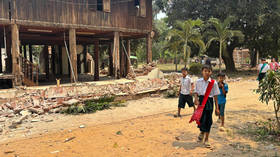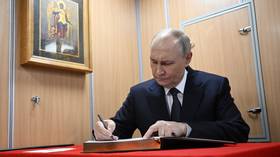Fraud ‘on grand scale’: Top journalist at reputable German magazine faked his stories for YEARS
One of Germany’s most popular papers, Der Spiegel, has found itself at the center of a scandal involving one of its top reporters who was caught fabricating elements of his stories.
Claas Relotius, who worked at Der Spiegel as a freelancer for 6 years until receiving a staff position in 2017, seemed to be a paragon of modern journalism. The 33-year-old has received numerous prestigious journalism awards, both in Germany and abroad.
Just this December he was awarded a prize by the German reporter’s association for his story about the life of a child in Syria. In 2014, Relotius was warmly welcomed by CNN who named him ‘Journalist of the Year.’
Also on rt.com ‘Gossip masquerading as reporting’: Alexandria Ocasio-Cortez flogs Politico for ‘fake news’However, his seemingly brilliant career has turned out to be a house of cards that is now falling apart, just as it had with Stephen Glass, a former staff writer at the New Republic who authored one of the most spectacular fabrication campaigns in the history of American journalism.
It was recently revealed that Relotius literally made up details in his stories and even “invented protagonists” – people he had never met in person.
One of his colleagues who was working with Relotius on a story about the situation on the US-Mexican border grew suspicious of some of the details in the journalist’s report. The man then tracked down two alleged sources Relotius quoted extensively in his text, only to find out that none of them ever actually met him.
The subsequent investigation by Der Spiegel into Relotius’ activities also uncovered that he fabricated details in another story including a claim that he had seen a sign in a US town that read: “Mexicans keep out.” When faced with the incriminating evidence, the journalist confessed to faking elements of his texts – not just in one story, but in a number of them.
Also on rt.com Media ‘in cahoots’ with French govt: Censored Yellow Vest protester speaks to RTSo far, at least 14 stories out of almost 60 pieces the journalist wrote for Der Spiegel’s print and online editions turned out to contain fake details, the magazine said, adding that that figure might potentially be higher, and warning that other media outlets might also be affected.
Over the years, Relotius worked for about a dozen German news outlets, including the well-known Die Welt, Die Zeit and Financial Times Germany. Notably, the list of his stories that were proven to be at least partially fake included several pieces that had won journalism awards, including stories about Iraqi children kidnapped by Islamic State and prisoners in Guantanamo.
READ MORE: 3 CNN journalists behind retracted Russia-Trump story resign
In a lengthy article which serves as both a clarification of the case and an apology, Der Spiegel said it was “shocked” by the discovery and offered an apology to its readers along with all those affected by Relotius’ articles. It also described the situation as "a low point in Der Spiegel's 70-year history."
Relotius, who resigned after the fraud came to light, told Der Spiegel that he regretted his actions and felt “deeply ashamed.” Meanwhile, the magazine’s management has set up a special investigative commission consisting of what it calls “experienced internal and external persons” to look through all of the journalist’s pieces and prepare recommendations to improve “safety mechanisms.”
Like this story? Share it with a friend!















